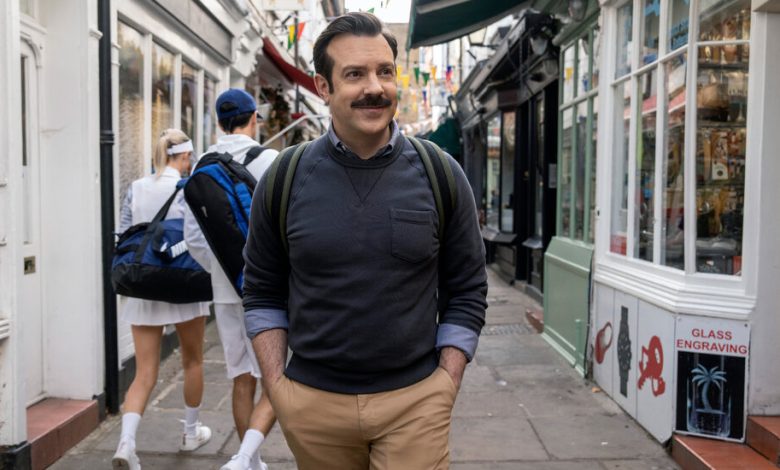Ted Lasso, and the Fantasy of Soft Masculinity

The opening credits of “Ted Lasso” aren’t subtle. The titular character wanders through a row of seats in an empty stadium, and as he sits down, his chair and those around it begin to change color, transformed by Ted’s presence. It’s so on the nose that it’s either charmingly winsome or tediously saccharine, depending on your disposition.
Listen to This Article
For more audio journalism and storytelling, download New York Times Audio, a new iOS app available for news subscribers.
But then again, “Ted Lasso,” now in its third (and ostensibly final) season, has never been about subtlety. The series follows Ted, an American football coach transplanted to Britain to coach AFC Richmond, a fictional Premier League team. Ted is played by the show’sco-creator Jason Sudeikis, who portrays the character with a steady mix of goofiness and pathos.
From the get-go, “Ted Lasso” has loudly proclaimed its values, almost always through big, sweeping speeches, and almost always through setting Ted’s earnestness as a counterweight to a pervasive cynicism that surrounds him. “For me, success is not about the wins and losses,” Ted contends in an early episode. “It’s about helping these young fellas be the best versions of themselves on and off the field.” The scabrous journalist Trent Crimm retorts that Ted is being “irresponsible.”
The men in sports television and movies are often wounded and broken, and sport is the arena of redemption, the thing that is going to put them back together. Sports heal all — in the 2001 film “Remember the Titans,” playing football is a way to mend acrimonious racial divides; for the young men in “Friday Night Lights,” manhood, community and the respect of one’s peers is earned one yard at a time.
But the promise of “Lasso” is different: Where we are used to seeing men do battle for connection, this universe assumes a more tender arrangement. The men in “Lasso” can try to isolate themselves and steep in their problems alone, but they will find that their safety net of other men will come barging in, ready to do what it takes to help. “Lasso” is a show built on softness.
But this is a fantasy. In real life, young men are often told that their moral absolution comes in the form of toughness, of suffering in silence. In real life, noxious figures who deride being emotional command a large audience. In real life, a 19-year-old offensive lineman, Jordan McNair, died in 2018 after being hospitalized for heatstroke. He collapsed after a team workout at the University of Maryland. ESPN published a report that highlighted a culture of “fear and humiliation” within the team, a culture that made it difficult to admit thirst, let alone exhaustion. But in “Lasso,” the fantasy comes to the fore. Forget winning in order to overcome your problems — “Lasso” suggests the reverse: You can’t win if you aren’t right within.
When Trent discovers a salacious secret that would sell thousands of newspapers if he were to publish it, he decides to keep it to himself because it’s not his secret to tell. After Isaac McAdoo, AFC Richmond’s captain, learns that his teammate has been hiding that he’s gay, Isaac ices him out for days, only to reveal that he was merely upset that his teammate didn’t trust him enough to tell him. Roy Kent, the gruff former-player-turned-coach, begins the series as the tough and silent type, but by the end of its third season, he’s coaching other men on how to process intense emotions gracefully.
The cheeriness and incessant earnestness may come easy to Ted, but “Lasso” is clear that they exact a cost. Ted spends much of Season 2 suspicious of seeking therapy (for reasons that are fully earned later in the series). He frequently drinks alone. He deals with panic attacks while refusing to confront the reasons they are becoming more frequent. Ted’s cheery outlook may be infectious, but the show is constantly calibrating whether he’s too positive. We learn that it’s the reason his marriage fell apart. We learn that Ted has been avoiding talking about his trauma around his father’s death. He’s not some enlightened sage — he’s a man trying his best, sometimes dishing out advice while eschewing it, too.
At the core of the “Lasso” fantasy is a delicate claim: People may do villainous things, but there are no real villains. The father of Jamie Tartt, a star player, is set up as abusive early in the series, but by the penultimate episode of the third season, has checked himself into rehab, and for once can show that he loves his son. Even Nate Shelley, Ted’s locker-room-assistant-turned-coach-turned-nemesis, spends much of the last season doubting his heel turn.
Occasionally, the showtips into the heavy handed. One particular scene, when the Richmond team gathers to discuss the intricate ethics of receiving nude photos, verges on a public service announcement. What makes the episode compelling, though, is that it was co-written by Keeley Hazell, a former Page Three model. (Hazell also plays Bex in the show.) In 2017, Ms. Hazell told The Independent that she was “a victim of revenge porn in 2007 and ‘revenge porn’ wasn’t even a terminology until around 2015.” In real life, revenge porn is on the rise. The men of “Ted Lasso” are sensitive and horrified by revenge porn. They are thoughtful and sympathetic, meant as a refuge, a shield from the potential horrors of the current masculinity crisis.
In 2021, “Ted Lasso” won a Peabody award. The citation recognizes the series for “offering the perfect counter to the enduring prevalence of toxic masculinity, both on-screen and off, in a moment when the nation truly needs inspiring models of kindness.”
If it is indeed the last season of “Ted Lasso,” the show’s greatest success is making an alternative, soft masculinity seem possible and worth pursuing, even if it remains a fantasy.
Audio produced by Tally Abecassis.
